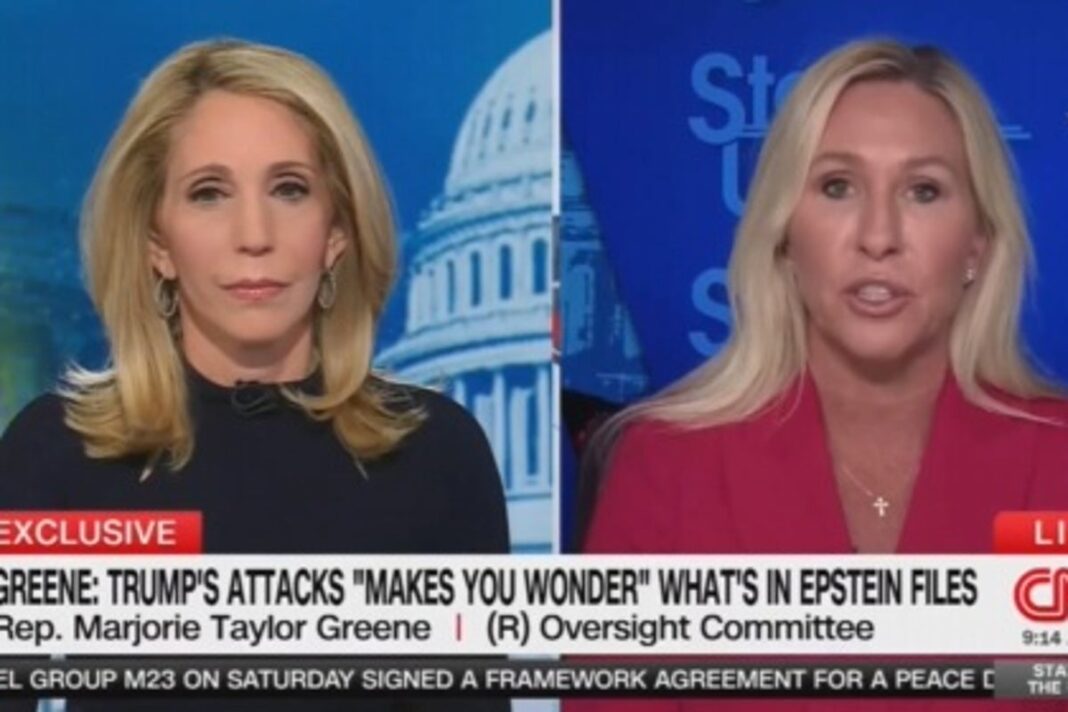Unraveling the Political Landscape: Marjorie Taylor Greene and Trump’s Fractured Alliance
In a contentious political climate, Georgia Republican Marjorie Taylor Greene recently voiced her concerns about former President Donald Trump, sparking considerable dialogue within the MAGA base. Appearing on CNN’s State of the Union, Greene questioned whether Trump has remained loyal to the foundational principles of the “America First” agenda, raising alarms about a potential rift in his support network.
The Heart of the Matter: Domestic vs. Foreign Priorities
Greene’s critique centered on Trump’s pivot towards foreign policy issues, suggesting it came at the expense of critical domestic concerns such as inflation and escalating living costs. She argued that the core of the MAGA message was about prioritizing American citizens, saying, “What the American people voted for with MAGA was to put the American people first.” This sentiment mirrors a common frustration among segments of the base that feel overlooked in favor of international engagements.
As the dialogue unfolded, Greene highlighted specific policies she views as contrary to the “America First” ethos, including promoting H-1B visas and allowing foreign students into American universities. For her, these policies jeopardize American jobs and opportunities, revealing a deep-seated concern about the future of the American workforce.
The Jeffrey Epstein Investigation: A Thorny Issue
In a separate but connected vein, Greene addressed the ongoing controversy surrounding Jeffrey Epstein’s investigation and its implications for Trump’s administration. Recent revelations, including previously unreleased emails from Epstein, have added layers of complexity to the narrative surrounding Trump’s connections with the disgraced financier. Greene insinuated that foreign interests might be pressuring the administration to downplay or conceal information related to Epstein’s crimes.
Her inquiry into whether Epstein may have had connections to Israeli intelligence raised eyebrows and lingered in the air during her CNN appearance. While Greene was hesitant to point fingers, her questioning suggests a scorching undercurrent of speculation surrounding foreign influence over American political matters, a concern that resonates with many in her base.
The Political Inferno: Implications for Trump’s Coalition
The divide within the MAGA coalition has implications that extend beyond personal grievances. As Greene’s comments reverberate through the political landscape, they could signal a shift in loyalty among Trump supporters, many of whom might find Greene’s positions refreshing in contrast to perceived establishment sentiments.
Greene’s accusations against both Trump and foreign powers reflect a growing sentiment among a subset of the Republican base that is outright suspicious of international alliances. Her call for an unwavering focus on domestic policy speaks to a wider desire for accountability, resonating with voters concerned about their everyday challenges being sidelined by global issues.
Trump’s Resilient Response: A Tactful Maneuver
Trump’s responses to the escalating situation have been multifaceted. His dismissive attitude toward ongoing investigations—characterizing the scrutiny as political theater—aims to solidify his connection with followers who remain unwaveringly loyal. He continues to frame these revelations as distractions, asserting a list of Democratic associations with Epstein while suggesting the narrative is being manipulated to undermine his credibility.
The former president’s blend of charm and bluster remains a tool for galvanizing his supporters. Yet, as factions within the party start to question his leadership, the sustainability of his coalition could hang in the balance.
Navigating the Fallout: An Evolving Landscape
As the political drama intensifies, Greene’s vocal dissent raises critical questions about the future of Trump’s influence within the GOP. With midterm elections looming, her call for a keen focus on domestic issues resonates with a constituency hungry for reform. Greene’s willingness to challenge Trump could lay the groundwork for potential fractures, creating opportunities for new leadership dynamics within the party.
The unfolding saga surrounding Trump, Greene, and the shadow of the Epstein investigation not only reveals the layers of personal politics at play but also signals a broader struggle for ideological direction among Republicans. For many supporters, it’s a pivotal moment—a chance to reassess loyalties, advocate for change, and possibly redefine what it means to embody the “America First” philosophy in a modern context.
As this narrative continues to develop, observers will undoubtedly keep a close eye on the interactions between Trump and Greene, looking for signs of a shift that could reshape the GOP’s future.



